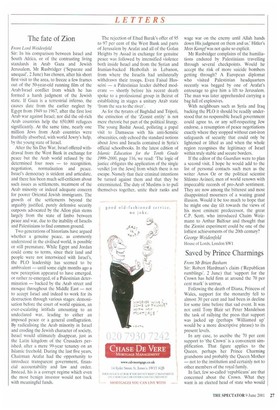The fate of Zion
From Lord Weidenfeld Sir: In his comparison between Israel and South Africa, or of the contrasting living standards in Arab Gaza and Jewish Jerusalem, Mr Rusbridger (`Separate and unequal', 2 June) has chosen, after his short first visit to the area, to freeze a few frames out of the 50-year-old running film of the Arab/Israel conflict from which he has formed a harsh judgment of the Jewish state. If Gaza is a terrestrial inferno, the causes date from the earlier neglect by Egypt from 1949 to 1967, after the first lost Arab war against Israel; nor did the oil-rich Arab countries help the 650,000 refugees significantly. At the same time, nearly one million Jews from Arab countries were fruitfully absorbed, with world Jewry's help, by the young state of Israel.
After the Six Day War, Israel offered withdrawal from the West Bank in exchange for peace but the Arab world refused by the determined four noes — to recognition, negotiation, normalisation and peace. Israel's democracy is strident and articulate, and there has been much self-criticism about such issues as settlements, treatment of the Arab minority or indeed adequate concern for poorer Oriental Jewish immigrants. The growth of the settlements beyond the arguably justified, purely defensive security outposts advocated by the AlIon plan stems largely from the state of limbo between peace and war, due to the inability of Israelis and Palestinians to find common ground.
Two generations of historians have argued whether a genuine peace, as commonly understood in the civilised world, is possible or still premature. While Egypt and Jordan could come to terms, since their land and people were not intertwined with Israel's, the PLO leadership has seemed to be ambivalent — until some eight months ago a new perception appeared to have emerged, or rather re-emerged, of a Palestinian determination — backed by the Arab street and mosque throughout the Middle East — not to accept Israel and indeed to work for its destruction through various stages: demonisation before the court of world opinion, an ever-escalating intifada amounting to an undeclared war, leading to either an imposed peace or a general conflagration. By radicalising the Arab minority in Israel and eroding the Jewish character of society, Israel would ultimately disappear, just as the Latin kingdom of the Crusaders perished, after a mere 99-year tenancy on an Islamic freehold. During the last five years, Chairman Arafat had the opportunity to introduce transparent government, financial accountability and law and order. Instead, his is a corrupt regime which even the most benign investor would not back with meaningful funds. The rejection of Ehud Barak's offer of 95 to 97 per cent of the West Bank and parts of Jerusalem by Arafat and all of the Golan Heights by Assad in exchange for genuine peace was followed by intensified violence both inside Israel and from the Syrian and Iranian-backed Hezbollah in Lebanon, from where the Israelis had unilaterally withdrawn their troops. Even Faisal Husseini — a Palestinian leader dubbed moderate — shortly before his recent death spoke to a professional group in Beirut of establishing in stages a unitary Arab state 'from the sea to the river'.
As for the tyrants of Baghdad and Tripoli, the extinction of the 'Zionist entity' is not mere rhetoric but part of the political liturgy. The young Bashir Assad, polluting a papal visit to Damascus with his anti-Semitic obscenities, only echoed the standard notions about Jews and Israelis contained in Syria's official schoolbooks. In the latest edition of Islamic Education for the Tenth Grade 1999-2000, page 116, we read: 'The logic of justice obligates the application of the single verdict [on the Jews] from which there is no escape. Namely that their criminal intentions be turned against them and that they be exterminated. The duty of Muslims is to pull themselves together, unite their ranks and wage war on the enemy until Allah hands down His judgment on them and us.' Hitler's Mein Kampf was not quite so explicit.
Mr Rusbridger complains of the humiliations endured by Palestinians travelling through several checkpoints. Would he accept the risk of more suicide bombers getting through? A European diplomat who visited Palestinian headquarters recently was begged by one of Arafat's entourage to give him a lift to Jerusalem. The man was later apprehended carrying a bag full of explosives.
With neighbours such as Syria and Iraq backing the PLO it should be readily understood that no responsible Israeli government could agree to, or any self-respecting Jew endorse, a resumption of peace negotiations exactly where they stopped without cast-iron safeguards of security that could only be lightened or lifted as and when the whole region recognises the legitimacy of Israel within truly stable and secure borders.
If the editor of the Guardian were to plan a second visit, I hope he would add to the list of personal contacts such men as the writer Amos Oz or the political scientist Shlomo Avineri, men of world renown with impeccable records of pro-Arab sentiment. They are now among the bitterest and most disappointed mourners of a waning grand illusion. Would it be too much to hope that he might one day tilt towards the views of his most eminent predecessor, the great C.P. Scott, who introduced Chaim Weizmann to Arthur Balfour and thought that the Zionist experiment could be one of the loftiest achievements of the 20th century?
George Weidenfeld
House of Lords, London SW1


































































 Previous page
Previous page